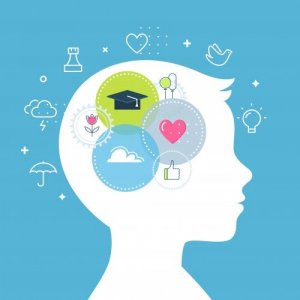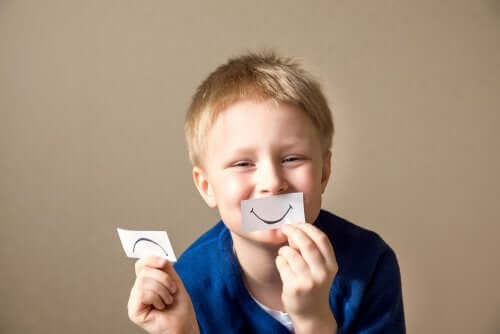Social-Emotional Abilities in Children

Without a doubt, you’ve heard talk of emotional education and the importance it has in the overall development of children. The main objective of this type of education is to maximize the acquisition of social-emotional abilities. These skills are fundamental in order for children to grow up and relate correctly to their surroundings.
“Emotional intelligence begins to develop in the earliest years. All the small exchanges children have with their parents, teachers, and with each other carry emotional messages.”
– Daniel Goleman –
Social-emotional abilities in children
According to authors Rafael Bisquerra Alzina and Nuria Pérez Escoda, social-emotional abilities can be defined as follows:
“The set of knowledge, capacities, abilities, and attitudes necessary in order to comprehend, express, and regulate emotional phenomena in an appropriate way.”
– Bisquerra and Pérez –
So, in the development of this set of knowledge, abilities, and attitudes, we can highlight the following actions:
- Identifying and regulating one’s own feelings, emotions, and behaviors.
- Recognizing one’s own personal qualities.
- Recognizing and understanding the feelings and viewpoints of others.
- Working and making an effort to achieve personal objectives.
- Accepting and respecting differences in others.
- Using positive communication.
- Preventing, handling, and resolving interpersonal conflicts in a constructive way.
- Acting on the basis of ethical and civic values.
- Making responsible decisions.
- Contributing to the well-being of others.

All of these actions fall into five different categories, which we should understand in order to give our children a complete education.
Classification of social-emotional abilities
As we said before, there is a series of key aspects to keep in mind in order to instill these competencies in children. So, these different social-emotional abilities fall into five different categories.
Emotional self-awareness
Emotional self-awareness means having awareness of one’s own emotions as well as the emotions of others – understanding and identifying how we feel. It also refers to the ability to understand the emotional environmental of a certain situation.
“Self-awareness is the stepping stone to emotional intelligence.”
-Daniel Goleman-
Emotional regulation
This involves handling, managing, expressing, and facing emotions correctly. The ability takes into account the fact that emotional states have an important influence on cognition and behavior.
“When I say manage emotions, I only mean the really distressing, incapacitating emotions. Feeling emotions is what makes life rich. You need your passions.”
– Daniel Goleman –
Emotional autonomy
This refers to the development of a series of characteristics and elements that have to do with personal self-management, such as:
- Hight self-esteem.
- Positive attitude in the face of life.
- Responsibility.
- Critical analysis of social norms.
- Emotional self-efficiency.
- And resilience.
“There is no separation of mind and emotions; emotions, thinking, and learning are all linked.”
– Eric Jensen –
Interpersonal intelligence – social awareness
This is the ability to comprehend the intentions, motivations, and desires of others, thus establishing healthy social relationships. Practicing effective and positive communication is part of this skill, as well as showing respect, empathy, prosocial attitudes, assertiveness, cooperation, etc.
“The social brain is in its natural habitat when we’re talking with someone face-to-face in real time. It’s picking up information that it wants in the moment. It’s reading prosody in voice, emotions, and nonverbal cues.”
– Daniel Goleman –

Life skills, responsible decision making
These abilities are necessary in order to face daily life in a satisfying way, and include:
- Establishing goals and objectives.
- Making decisions and assuming responsibility.
- Looking for support and help when needed.
- Recognizing and respecting one’s own rights and duties as well as those of others.
These skills allow individuals to organize their lives in a well-balanced manner and experience a profound and subjective sense of well-being.
“People with well-developed emotional skills are also more likely to be content and effective in their lives, mastering the habits of mind that foster their own productivity; people who cannot marshal some control over their emotional life fight inner battles that sabotage their ability for focused work and clear thought.”
The learning of social-emotional skills
While it’s important to maximize social-emotional skills during childhood, we must also understand that, in order to acquire them, children need a certain level of maturity. So then, we can say that the learning of emotional education is a process that starts during childhood and lasts a lifetime.
Without a doubt, you’ve heard talk of emotional education and the importance it has in the overall development of children. The main objective of this type of education is to maximize the acquisition of social-emotional abilities. These skills are fundamental in order for children to grow up and relate correctly to their surroundings.
“Emotional intelligence begins to develop in the earliest years. All the small exchanges children have with their parents, teachers, and with each other carry emotional messages.”
– Daniel Goleman –
Social-emotional abilities in children
According to authors Rafael Bisquerra Alzina and Nuria Pérez Escoda, social-emotional abilities can be defined as follows:
“The set of knowledge, capacities, abilities, and attitudes necessary in order to comprehend, express, and regulate emotional phenomena in an appropriate way.”
– Bisquerra and Pérez –
So, in the development of this set of knowledge, abilities, and attitudes, we can highlight the following actions:
- Identifying and regulating one’s own feelings, emotions, and behaviors.
- Recognizing one’s own personal qualities.
- Recognizing and understanding the feelings and viewpoints of others.
- Working and making an effort to achieve personal objectives.
- Accepting and respecting differences in others.
- Using positive communication.
- Preventing, handling, and resolving interpersonal conflicts in a constructive way.
- Acting on the basis of ethical and civic values.
- Making responsible decisions.
- Contributing to the well-being of others.

All of these actions fall into five different categories, which we should understand in order to give our children a complete education.
Classification of social-emotional abilities
As we said before, there is a series of key aspects to keep in mind in order to instill these competencies in children. So, these different social-emotional abilities fall into five different categories.
Emotional self-awareness
Emotional self-awareness means having awareness of one’s own emotions as well as the emotions of others – understanding and identifying how we feel. It also refers to the ability to understand the emotional environmental of a certain situation.
“Self-awareness is the stepping stone to emotional intelligence.”
-Daniel Goleman-
Emotional regulation
This involves handling, managing, expressing, and facing emotions correctly. The ability takes into account the fact that emotional states have an important influence on cognition and behavior.
“When I say manage emotions, I only mean the really distressing, incapacitating emotions. Feeling emotions is what makes life rich. You need your passions.”
– Daniel Goleman –
Emotional autonomy
This refers to the development of a series of characteristics and elements that have to do with personal self-management, such as:
- Hight self-esteem.
- Positive attitude in the face of life.
- Responsibility.
- Critical analysis of social norms.
- Emotional self-efficiency.
- And resilience.
“There is no separation of mind and emotions; emotions, thinking, and learning are all linked.”
– Eric Jensen –
Interpersonal intelligence – social awareness
This is the ability to comprehend the intentions, motivations, and desires of others, thus establishing healthy social relationships. Practicing effective and positive communication is part of this skill, as well as showing respect, empathy, prosocial attitudes, assertiveness, cooperation, etc.
“The social brain is in its natural habitat when we’re talking with someone face-to-face in real time. It’s picking up information that it wants in the moment. It’s reading prosody in voice, emotions, and nonverbal cues.”
– Daniel Goleman –

Life skills, responsible decision making
These abilities are necessary in order to face daily life in a satisfying way, and include:
- Establishing goals and objectives.
- Making decisions and assuming responsibility.
- Looking for support and help when needed.
- Recognizing and respecting one’s own rights and duties as well as those of others.
These skills allow individuals to organize their lives in a well-balanced manner and experience a profound and subjective sense of well-being.
“People with well-developed emotional skills are also more likely to be content and effective in their lives, mastering the habits of mind that foster their own productivity; people who cannot marshal some control over their emotional life fight inner battles that sabotage their ability for focused work and clear thought.”
The learning of social-emotional skills
While it’s important to maximize social-emotional skills during childhood, we must also understand that, in order to acquire them, children need a certain level of maturity. So then, we can say that the learning of emotional education is a process that starts during childhood and lasts a lifetime.
All cited sources were thoroughly reviewed by our team to ensure their quality, reliability, currency, and validity. The bibliography of this article was considered reliable and of academic or scientific accuracy.
- Bisquerra, R. y Pérez, N. (2007). Las competencias emocionales. Educación XXI, 10, 61-82. doi: 10.5944/educxx1.
This text is provided for informational purposes only and does not replace consultation with a professional. If in doubt, consult your specialist.








